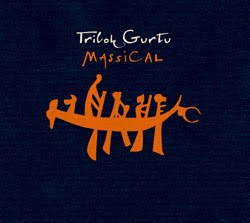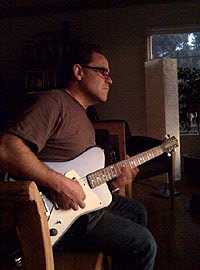 Trilok Gurtu wanders between worlds, although his odyssey never went so smoothly from point A to point B. He didn't just come from India to stay in Europe. His sense of direction is much more complex. He drew circles, spanned nets and created intensely woven networks of influences from various regions and musical epochs. Contemporary terms such as jack of all trades or multitasker are highly unsatisfactory in defining Trilok Gurtu’s depth of spirituality, non-judgmental empathy for different cultures, his unending search for new ways to express himself on the solid foundation of a whole arsenal of traditions. Trilok's long-awaited new album "Massical" will be released at the end of May on the BirdJAM label. Trilok will also perform throughout 2009 to promote the album.
Trilok Gurtu wanders between worlds, although his odyssey never went so smoothly from point A to point B. He didn't just come from India to stay in Europe. His sense of direction is much more complex. He drew circles, spanned nets and created intensely woven networks of influences from various regions and musical epochs. Contemporary terms such as jack of all trades or multitasker are highly unsatisfactory in defining Trilok Gurtu’s depth of spirituality, non-judgmental empathy for different cultures, his unending search for new ways to express himself on the solid foundation of a whole arsenal of traditions. Trilok's long-awaited new album "Massical" will be released at the end of May on the BirdJAM label. Trilok will also perform throughout 2009 to promote the album.Trilok Gurtu was born in Bombay in 1951 in an extremely musical family. His grandfather was a highly respected sitar player and his mother Shoba Gurtu (who died in 2004) was among the most highly renowned Indian singers. There was practically no way for Trilok not to seek a musical career, although his path to percussion was hardly preordained. Today, Gurtu remembers how “my entire family played harmonic instruments and sang and danced. My brother Ravi and I are the only percussionists, although we're not quite sure how we got there. My mother told me when I was three or four years old that she had a percussionist who always came too late or never came in all. Somewhere along the line, my father said: Trilok drums on the table all the time - get him down. And I had to accompany my mother. That's how I chose my instrument - or the instrument chose me. I learned just as much song as percussion when I accompanied my mother.”
That was a talent that was to be very useful to him later. He extended his arsenal of tablas on congas, bongos and drums and then he started a percussion band with his brother and was influenced by John Coltrane and Jimi Hendrix. In the 70s, he toured Europe and later America with the Indian singer Asha Bhosle, performed with Charlie Mariano and Embryo and joined up with Don Cherry in Sweden whose universal musical spirit was driving the future for him. Starting in 1977, he belonged to the Family of Percussion and worked together with innumerable jazz musicians. Then in the mid-80s, he joined the Ethno-Jazz Pioneers of Oregon following in the footsteps of Collin Walcott who had a fatal accident and gave them a completely new way of looking at things with this powerful spirituality. In 1988, he started his virtually historical work with John McLaughlin that was to continue for four years. Just incidentally, he played with musicians such as Joe Zawinul, Jan Garbarek, Pharoah Sanders, Bill Laswell and Pat Metheny.
Gurtu cut his first solo album Usfreth in 1988 whose visionary spirit is far ahead of his own time to be appropriately honoured by the critics and the general public. He tore down the bastions of jazz and world music together with Ralph Towner, Don Cherry, Shankar and his mother Shoba. The rhythmic and harmonic interweaving already contains all of the ingredients that were to rock the world music a decade later in Drum’n’Bass. Since then, he has persistently added elements of various provenance to his musical cornucopia to develop a form of music that finds hierarchies superfluous and has reached its latest high water mark in the new CD entitled Massical. Gurtu turned the pages back and recalls that “I got a lot of flak for my first record because I was trying out something new. It's a lot easier just to imitate somebody else. I tried to forge a bond between my love for Africa and India, but somewhere along the line I had the feeling I was respecting the music too much. I have to remember to maintain my own self respect. Guess what? My music doesn't exist without me! So, I was a little bit more relaxed about my music and concentrated on what I heard myself. On Massical, I didn't think much about music; I just played.”
That's why the songs on Massical feel like acoustic balm. When you're listening, you forget everything you ever learned about music. You drop all your prejudices and surrender yourself to the flow that seems to drive out the gold of the millennia through the present into the future. Gurtu had to drop some ballast himself to be able to credibly transport that feeling. He is an incredible virtuoso who had a tendency to play too much. But virtuosity only plays second fiddle on Massical and just lets the musical process fall into place. Gurtu says "I'm not just showcasing myself. If the music doesn't call for virtuosity, I don't use it. But, let's not forget that there are pieces that are awfully difficult to play and most musicians would not be able to. That music is virtuoso, even though it sounds simplistic. When the musicians cut their first or second record, they usually put their instrument front and centre. But I want to feature my music. There's a difference there. The groove is much more important than virtuosity.“
Gurtu’s music is universal. Of course, he still has a reputation of being an ambassador for Indian music in Europe, but those categorisations are totally unimportant to him. “I was born in India. That's where my roots are. Because I've always played virtuoso, people always categorise me as jazz. There was no category of world music when I started. I don’t come from any American school and I never pretended to. But Indian music is based on improvisation and the music from Bollywood is very groovy - almost like Afro-Brazilian music. I use this repertoire to translate my thoughts and feelings, but I could just as well be from China. My music is my music everywhere and I'm the way my music sounds."
Gurtu doesn't have any problems translating the principles and attitudes of Indian, American and European improvisation. On the contrary, he puts his faith in what all of these musical idioms have in common spiritually. “At the onset, you think everything is segmented into classical music, jazz and all those other genres. But, when you approach music in a more spiritual fashion, you notice that the spirit the music is build on is the same everywhere. People just perceive it differently because they think we come from different traditions. Mozart and Bach also improvised. The first piece in my album is called Seven Notes To Heaven and we only have these seven (and with the semitones) we have 12 notes. That's the same in Africa, Europe, India and America, everywhere. If you hit them right, you come closer to God. For instance, there's a tremendous amount of Mozart in the music from Bollywood. Indians don’t know that and they believe it was written by Indian musicians. Even Stravinsky and the other Russian composers have blossomed in Bollywood because a fit so well. If it's good, it doesn't matter where it comes from.”
Needless to say, the song title Seven Notes To Heaven reminds us of Miles Davis. But if you think that this piece of music is supposed to be a tribute to the man with the horn, you're getting ahead of yourself. Trilok Gurtu is among the few musicians in the sphere of jazz who do not say they hail back to Miles Davis. He discovered how important it is to know that less is more even in cultures that existed before jazz. “My mother always told me that concerts take three hours - so play slowly. Jazz is only the most recent form of improvised music. I respect Miles very much - his courage to change music. But, for me, Don Cherry was much more important because his music changed the world. He had a feeling for Afro-Indian music and I think he would like to play the things that are on this album.”
Don Cherry was also a musician who pushed the basic musical concept out of their glass case and made the highest level of music available to everyone by very simple means. That's exactly how Massical, the title of Gurtu’s album should be understood. His premise is that "music has to be there for everybody – it is the masses who have to decide about music and not the classes. The classes always have the money. But you always have to reach the masses. That's why I say music is massical, not classical.“ That statement is his firm conviction without forcing itself upon you and it has a very human texture that permeates the entire album. Massical is much more than a piece of beautiful music. It is a sustainable contribution to democratising our listening habits and overcoming ethnic and social barriers and art that has long since been overdue.
